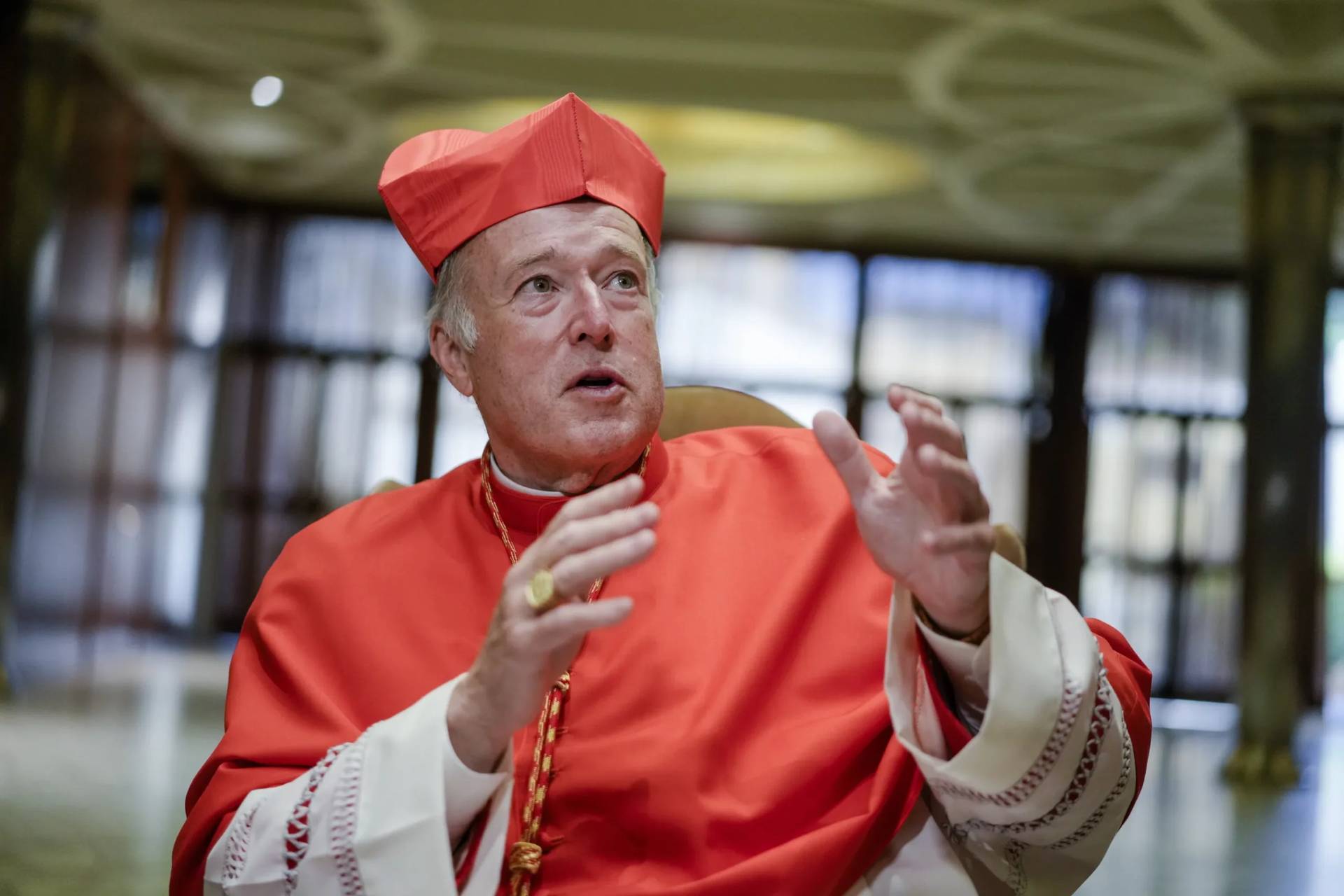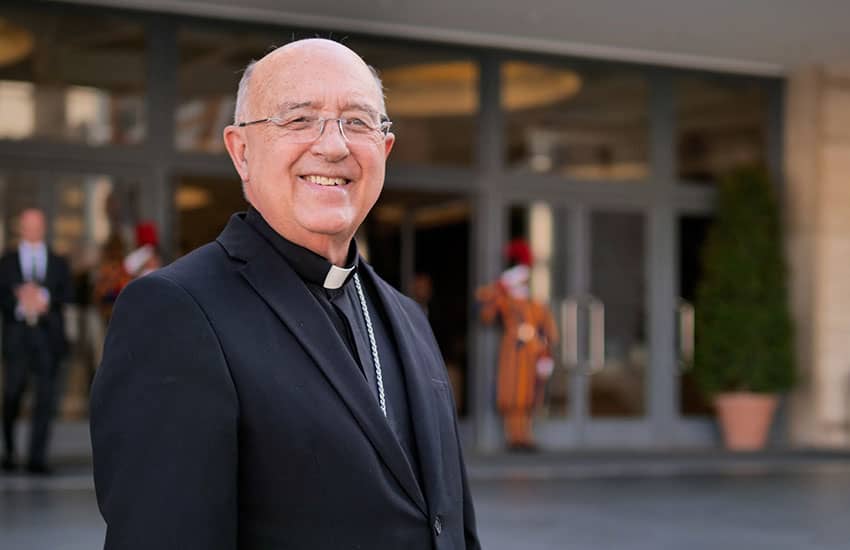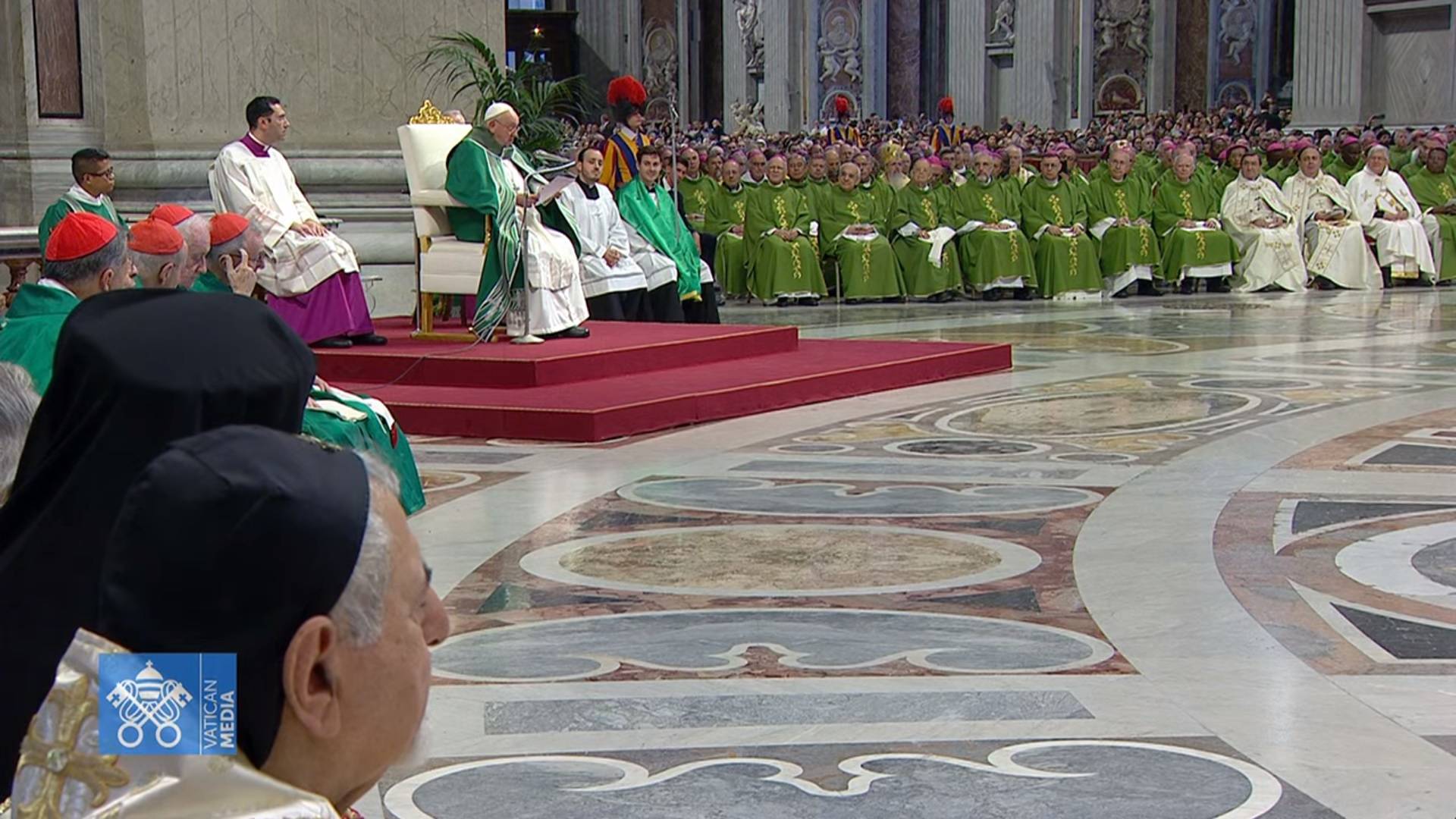ROME – Asked about conservative Catholics who feel they are not represented in the ongoing Synod of Bishops on Synodality, specifically Latin Mass devotees struggling with restrictions imposed by Pope Francis, American Cardinal Joseph Tobin said they still have a place in the church.
Asked during an Oct. 11 press briefing whether the agenda for the synod was perhaps determined too carefully from authorities “on high,” Tobin said that has not been his experience.
Referring to the diocesan consultation phase of the synod, which began in October 2021, Tobin said the overwhelming impression of the people he knows is, “What I said is there. Maybe not with the emphasis that everybody wanted, because people have their own passion, but they didn’t say, ‘I was ignored.’”
“This was repeated in the national synthesis that served as a basis for the continental meeting,” he said, saying he participated in three different sessions of North America’s continental synod assembly in English, Spanish and French. He was surprised, he said, “That I didn’t hear at any of those meetings people saying, ‘What I said or what was said at our local church isn’t there,’ reflected in the continental document.”
“We’ll see as we go ahead, because we’re still fairly new in the process for this synod…but I’m fairly confident that things did not begin from on high, but the beauty of this process is, it begins from the base,” he said.
Tobin was asked about Catholics who feel that their concerns were not reflected in the synod’s preparatory working document, called the Instrumentum laboris, which was drafted based on each of the seven continental assembly documents, specifically those who attend the Traditional Latin Mass and who feel “banished” by restrictions Pope Francis imposed in 2021.
In response, Tobin said “the experience of feeling banished is something that is sadly part of the signs of the times, not only for people who very much love the traditional Mass,” but for other communities too.
To this end, he recalled how while he was still Archbishop of Indianapolis, he had to close parishes “because they had simply lost their original purpose,” and some of these parishes had been built along an old railroad line that was no longer active, and the archdiocese couldn’t afford to keep all of them running.
“We had to discern with the people what was the way forward, and we had to make some very painful decisions,” Tobin said, saying one man appealed the closure of his parish all the way up to the Vatican’s highest court, the Apostolic Signatura.
However, years later, when he was already reassigned to Newark, Tobin said he got a letter from the man who, after some time in his new community, admitted that closing the previous parish “was good for us, but we didn’t know it at the time.”
“Now, that’s probably, I can see it’s not satisfactory to you,” he said, referring to the journalist who asked the question, but said that for those who prefer to attend the Traditional Latin Mass, “under the conditions of the two motu proprio as well as the decisions of [the Dicastery for] Divine Worship, there are still opportunities for it, but perhaps not what they’ve been accustomed to.”
“I know that it’s caused a lot of grief among people who have particularly identified with that Mass, but I don’t think they’ve been banished from the Catholic Church,” he said.
Tobin is among the participants in this month’s Synod of Bishops on Synodality, a process aimed at transforming church structures to make it a more welcoming and inclusive place for its members, but which has become contentious over certain hot-button issues such as women’s priestly ordination, the married priesthood, and outreach to the LGBTQ+ community.
He spoke at a press conference Tuesday alongside Colombian Sister Gloria Liliana Franco Echeverri, president of the Latin American Confederation of Religious, as synod participants began discussing the second part of the Instrumentum laboris, which is focused on being an “instrument of union with God and of unity of the human race.”
Tobin said the synod is an “intense experience” of the church’s defining characteristics of being “one and Catholic.”
“Catholic of course, you can write it with a small ‘c’ if you prefer, it doesn’t mean denomination, because almost all Christians profess belief in the one, holy, Catholic and apostolic church, we’ve been doing it for 17 centuries,” he said, noting that the year 2025 mark the centenary of the adoption of the Nicaean Creed during the first Ecumenical Council of Nicaea.
Tobin said he grew up in a multicultural neighborhood of Detroit, and has spent the better part of his 45 years as a priest “in cultures that weren’t my own, at least the one I was raised in.”
“So, this is an experience that has always fascinated me about people looking at the same things, not with differences that necessarily divide, but ways that can enrich each other,” he said, saying he has participated in four synods so far, and the current synod is “the most diverse.”
Though participants come from all over the world, many “are concerned about the same things, and this is what we do, we listen.”
“That’s what the church does, we believe in a God who became flesh and blood, it’s not that he stayed in some isolated heaven, so the church must be increasingly concerned with what has to do with the body, the members,” he said.
Asked what needed to be done in order to better welcome those who don’t feel accepted by the church, Tobin said “the outreach to those who feel that they are not at home in the Catholic Church” is a concern in his diocese too.
To this end, he recalled how several years ago he welcomed a pilgrimage of LGBTQ+ Catholics, describing the group as one “of people who felt marginalized because of their sexual orientation.”
Tobin said that while he could not stay for the whole meeting with the group, he welcomed them, and his auxiliary bishop, Manuel Cruz, offered a brief reflection on the beauty of Newark’s Cathedral Basilica of the Sacred Heart, saying the basilica “is a wonderfully beautifully place, but it’s most beautiful when the doors are open.”
“So, I think the real beauty of our Catholic Church is clearer when the doors are open and welcoming. It’s my hope that this synod will help us do that in an even more significant way,” Tobin said.
Noting that there were people from both Russia and Ukraine in one of his small group discussions, Tobin said the ongoing war in Ukraine has been as part of their discussion, along with “several other areas of conflict, one of which broke out over the weekend,” meaning the war between Israel and Hamas.
“The wars that have the headlines are there, but also the wars that unfortunately are not always covered in the press, which are the wars in Africa and some of the conflicts in Asia. These are part of the reflection as well,” he said.
Asked about perceptions that not all synod participants had adequate time to express their thoughts or concerns given time limits and the assignation of discussion topics to certain groups, Tobin said that has not been the case, and that all participants have had plenty of time to speak freely.
In previous synods, “I used to feel sorry for the other bishops, because they said, we can’t talk about what we want to talk about. I don’t think any of us can say that,” Tobin said, saying synod participants were asked about their preferences for discussion topics before arriving, and pretty much everyone got their first preference.
“Even more importantly, other bishops and members have come prepared, because they have been listening to the people of God for several years now about what they think is important. I haven’t felt handcuffed, and I haven’t heard that expressed to me,” he said.
Asked about the synod’s “discernment” process and how that aligns with whatever decisions Pope Francis might make after the process is over, Tobin said, “You can define it this way: [In] a synod, I discern, you discern, he decides.”
Although this might sound “authoritarian,” Tobin said he has worked closely with Pope Francis on many occasions, and “he listens very carefully, he’s very well informed, he takes very seriously the unity of the church.”
Tobin said there were some occasions in a synod when a decision was taken by a vote, but the pope did not accept it, arguing that “it was a parliamentary decision, not a decision taken as a result of discernment.”
This synod allows time for prayer and reflection after every 3-4 interventions, he said, saying prayer punctuates every day of the synod, and that with prayer, “I think discernment has happened, at least the opportunity for it. I believe we’re availing ourselves of it and I think the Holy Father will take seriously whatever comes out of it.”
Follow Elise Ann Allen on X: @eliseannallen













